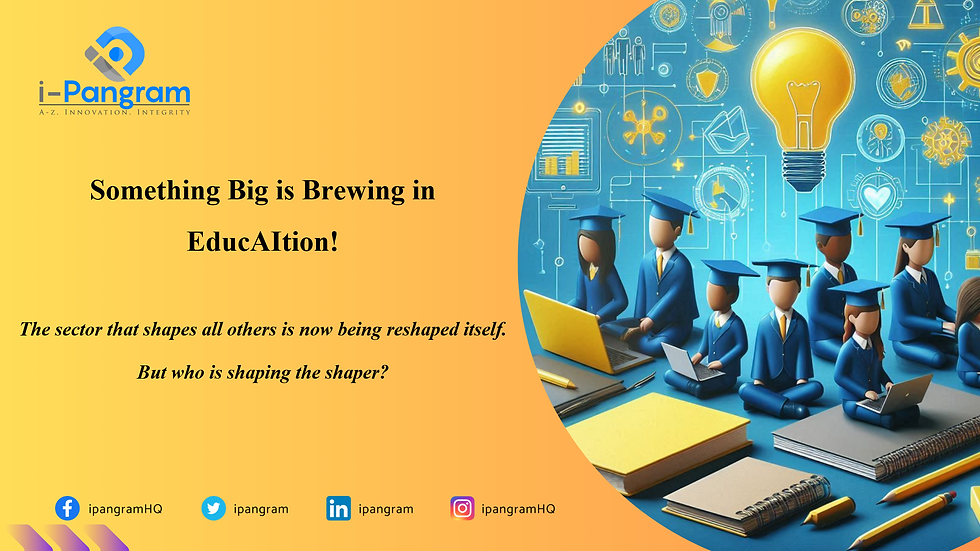Something Big is Brewing in EducAItion!
- pournima6
- Feb 18, 2025
- 4 min read
Updated: Feb 19, 2025

Something Big is Brewing in EducAItion!
The sector that shapes all others is now being reshaped itself. But who is shaping the shaper?
Yes, you guessed it right – it’s AI!
AI is not just transforming teaching-learning; rather revolutionizing how education adapts, evolve, and delivers value. AI has become the catalyst of transformative change in the education sector right from personalizing learning experiences to streamlining administrative processes.
In this article, let’s dive into the transformative effect of artificial intelligence on the education and explore what the future holds for the industry by 2030.
How is AI Revolutionizing the Education Sector?
There are many ways AI has been impacting the education sector. From online classes to online exams, everything around this sector has turned digital. A few ways are mentioned below:[5]
Tools | How It Helps |
Learning Management Systems (LMS) | Centralized course management, automated grading, communication tools, and mobile access. |
Intelligent Tutoring Systems (ITS) | Personalized learning paths, diagnostic assessments, tailored content delivery, and progress monitoring. |
Adaptive Learning Platforms | Customizes content based on assessments, real-time adaptation to student needs, and progress tracking |
Emotional and Social Learning (SEL) | Real-time emotional recognition, personalized interventions, virtual SEL coaches, and data-driven insights. |
Global AI Market Growth in Education: Insights from 2022 to 2033
According to Maximize Market Research, the expected CAGR for the global AI in Education market is 43.8% during the forecast for 2024-2030. Let’s have a peek into the insights for the upcoming years:[1]
2022: In this year, the global AI in the education sector was valued at $3.79 billion.[2]
2025: The market is projected to expand to $6.6 billion.[4]
2026: AI in education is expected to reach $8.9 billion globally.[4]
2027: By this year, the AI training sector is anticipated to grow significantly, reaching $12.1 billion.[4]
2028: The global AI market size in education will likely grow to $16.3 billion.[4]
2029: AI in education is forecasted to increase further to $22.0 billion.[4]
2030: The market size is predicted to hit $29.7 billion.[4]
2031: This year is projected to mark a major milestone with the market size reaching $40.2 billion, driven by increasing demand for AI in education.[4]
2032: AI in education is expected to grow to $54.3 billion.[4]
2033: By this year, the market size is forecasted to reach an impressive $73.3 billion.[4]

Global Hotspots: Regions Leading in AI-Driven Education
According to a recent article on a report by Skyquest, AI in the education market is being analyzed by 5 regions which are as follows:[6]
Region 1: North America
Region 2: Europe
Region 3: Asia-Pacific (APAC)
Region 4: Latin America (LATAM)
Region 5: Middle East & Africa (MEA)

Leading Players & Emerging AI Trends Shaping the Future of Education
Here are a few emerging AI trends in education, along with real-life education providers that are actively integrating AI technologies into their systems:
Personalized Learning: Personalized learning means AI-powered systems that adapt the curriculum to meet the needs of each student, providing personalized learning experiences that consider a student’s pace, learning style, and abilities.
E.g. DreamBox uses adaptive learning technologies to offer personalized K-8 math instruction.[7]
AI-powered Intelligent Tutoring Systems: These systems provide personalized assistance to students, guiding them through problems and offering feedback in real-time, similar to having a personal tutor available at all times.
E.g. Squirrel AI uses adaptive learning systems to personalize lessons based on student performance, helping improve learning efficiency.[8]
Automated Grading and Feedback: AI is being used to automatically grade assignments, exams, and papers, offering quick feedback that saves time for instructors and provides more timely learning opportunities for students.
E.g. Gradescope by Turnitin uses AI to grade assignments and provide feedback for educators, especially in large classes.[9]
AI for Student Support and Engagement: AI-powered chatbots and virtual assistants are enhancing student engagement by answering queries, providing course information, and offering personalized advice.
E.g. Georgia State University uses an AI chatbot named "Pounce" to guide students through administrative tasks and help them stay on track with their education.[10]
Content Creation and Curation: AI helps in automatically generating or curating educational content, making it easier for educators to find resources tailored to their curriculum and for students to access relevant learning materials.
E.g. Knewton (by Wiley) uses AI to create personalized learning paths, curating content that matches each student's learning pace and proficiency.[11]
AI in Language Learning: AI-driven language learning platforms use speech recognition, real-time feedback, and personalized courses to enhance the learning of new languages.
E.g. Duolingo uses AI algorithms to offer personalized language learning experiences and adaptive lessons tailored to the learner’s progress.[12]
Get Ready for an AI-Powered Education Future!
Whether you're an educator or a decision-maker in an educational institution, embracing AI is essential for the future of education. AI can enhance personalized learning, streamline administrative tasks, and provide valuable insights, transforming the educational landscape for all stakeholders.
Curious about AI’s potential in education? Let’s explore the future of learning.
References:
AI in Education Market- Global Industry Analysis and Forecast (2024-2030)
https://www.globalmarketestimates.com/market-report/ai-in-education-market-3891
https://www.verifiedmarketresearch.com/product/ai-in-education-market/
https://www.discoveryeducation.com/solutions/math/dreambox-math/
https://news.gsu.edu/2022/03/21/classroom-chatbot-improves-student-performance-study-says/
https://d3.harvard.edu/platform-digit/submission/knewton-personalizes-learning-with-the-power-of-ai/




Comments